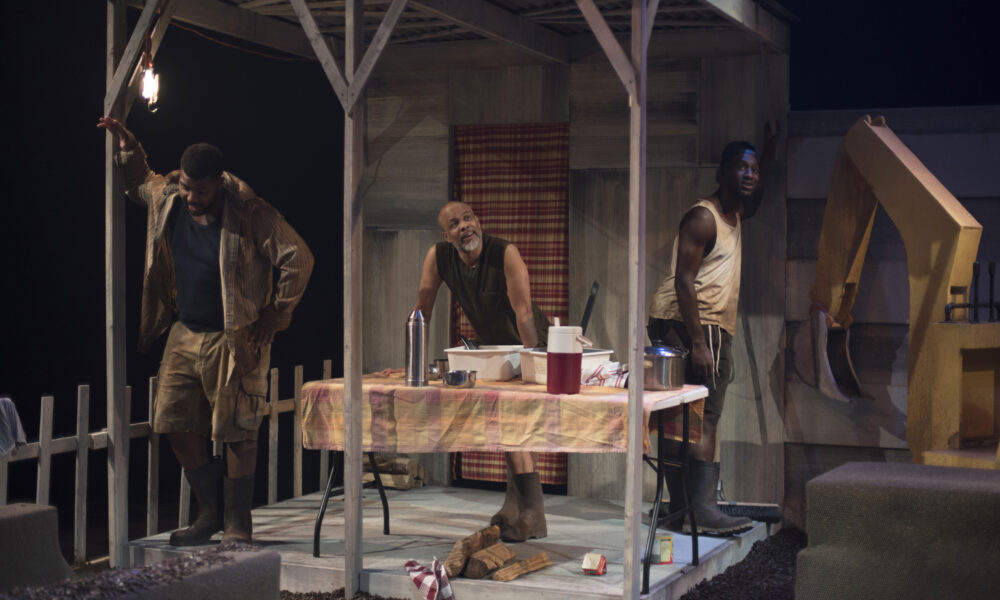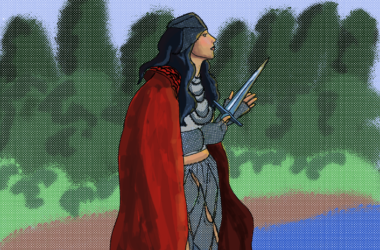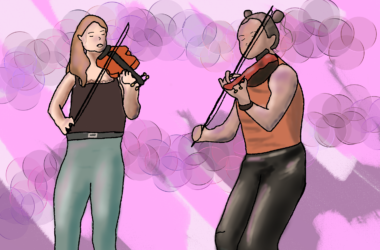In a town, on a hill, within a graveyard, there are two gravediggers. Solomon (Christian Paul) and Abdul (Chance Jones) live, breathe, and work the graves, day in and day out, weathering torrential rains, pandemic, and death. They are overworked. They are tired. They continue to dig.
Solomon and Abdul are the foundational characters of Diggers, a play co-commissioned by Black Theatre Workshop and Prairie Theatre Exchange to undergo its world premiere during Black History Month. Diggers is part of playwright Donna-Michelle St. Bernard’s 54-ology, a project where she and her collaborators work to bring to life performance works inspired by stories centered in and around each of Africa’s 54 sovereign states. The play is a love letter to gravediggers in Sierra Leone, one of many countries to experience Ebola outbreaks and their devastating casualties in recent years.
It’s a unique performance. The audience enters to see bleachers surrounding a fenced-in stage where Abdul sweeps rubber “dirt” near a raised grave. Meanwhile, the audience trickles in, watching him; he is alone. The house lights dim. We watch Abdul with more intention.
Not much happens during the 90-minute runtime. We see the daily routine of wake, dig, sleep—a fact of life that many in Sierra Leone and elsewhere face every day. Early in the play, Solomon’s nephew Bai (Jahlani Gilbert-Knorren), a young adult in his early twenties, comes to visit the graveyard. He is jumpy and full of life, and then his auntie sends him to stay and work as a gravedigger. Bai is unskilled in the art of gravedigging; Solomon and Abdul dig in sync while Bai exudes effort, trying to keep up. He breaks one of their precious shovels. On their radio, you can hear an announcer mention a pandemic. The gravediggers make no mention of it. The bodies keep arriving.
The stage’s fence is a curious part of the set design. Does it keep the gravediggers in or the townspeople out? Only one woman visits the three during the performance: Sheila (Warona Setshwaelo), a town council member who brings them food provisions. I think Abdul has a crush on her—he smiles and seems lighter at her small kindness. But the gravediggers need more than food; they need supplies to fix their south wall, raincoats to survive the downpours, and sandbags to prevent the collapse of their graveyard. Yet the town needs gloves for their doctors. Their people need medicine. In a town without enough means, how do you support all essential workers?
There’s a sense of powerlessness in each character’s eyes, as they realize the overwhelming number of bodies is continuing to arrive with the beeping of trucks. Each gravedigger relies on different coping mechanisms to keep up their spirit. Bai has a DIY model of their town, made of scraps and dedication. Solomon has an imaginary dog, a memory of his real dog who had since passed. The others agree not to shatter the illusion, telling Solomon not to let it escape. And Abdul has this, his mind, internal strength, and total resilience. He taps a finger to his forehead when he speaks that line. He says, “you can bust my back, my knees, my shovel. But don’t take this. That’s for me.”
In a town, on a hill, within a graveyard, there are three gravediggers. Stuffed onto a tiny stage, the four actors bring the show’s message to life; essential workers are the backbone of any community, and despite their perseverance, it is exhausting work. They are the individuals who carry the life and death of a community. It is individuals like Sheila who help them survive. Diggers isn’t trying to explain this real situation—but it shows its audience that their comfort relies on others’ depraving labour.









